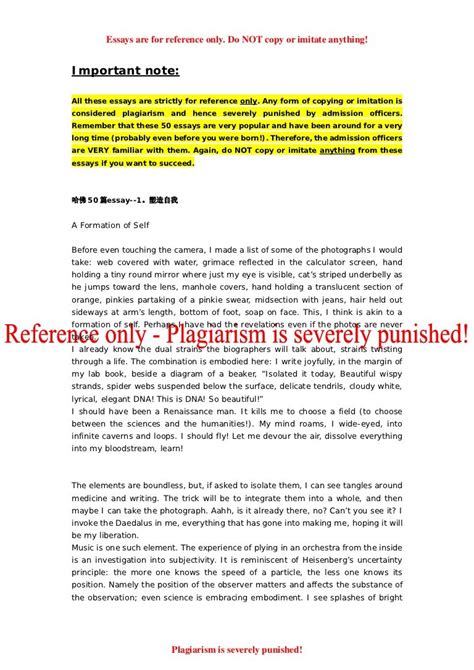In the highly competitive landscape of college admissions, crafting a compelling Harvard application essay is crucial for aspiring students seeking to stand out and secure a place among the prestigious Ivy League institution’s incoming class. This comprehensive guide will delve into the intricacies of crafting an exceptional Harvard application essay, providing you with valuable examples, insights, and a step-by-step approach to guide you through the process.

Understanding Harvard’s Essay Requirements
Harvard University requires applicants to submit two essays: the Common Application essay and the Harvard-specific personal statement. While the Common Application essay provides an opportunity to share your personal narrative, the Harvard-specific essay offers a platform for you to demonstrate your intellectual curiosity, values, and aspirations.
Crafting the Harvard Application Essay: A Step-by-Step Guide
Step 1: Brainstorming Ideas
Begin by brainstorming ideas that align with Harvard’s values of excellence, innovation, and diversity. Consider the following:
- Personal experiences: Describe a transformative experience that has shaped your character or deepened your understanding of the world.
- Intellectual pursuits: Showcase your passion for a particular academic or extracurricular activity that has fostered your intellectual growth.
- Impactful contributions: Share how you have positively impacted your community or made a difference through volunteering, advocacy, or other forms of service.
- Unique perspectives: Highlight your unique qualities and experiences that set you apart and would make a valuable addition to Harvard’s diverse community.
Step 2: Selecting a Topic
Select a topic that is both compelling and specific. Avoid overly broad or vague topics that fail to capture your individuality. Instead, focus on a particular area of interest or experience that you can discuss in depth.
Step 3: Developing Your Thesis
Formulate a clear and concise thesis statement that encapsulates the main idea or argument of your essay. This statement should guide the structure and content of your writing.
Step 4: Writing the Introduction
Captivate the admissions committee with a powerful introduction that grabs attention and provides context for your topic. Consider using a compelling anecdote, a thought-provoking question, or a vivid description that draws the reader into your world.
Step 5: Developing Body Paragraphs
In the body paragraphs, provide specific examples and evidence to support your thesis statement. Use vivid language, sensory details, and concrete examples to bring your experiences to life. Ensure each paragraph has a clear topic sentence and flows logically from the previous one.
Step 6: Crafting the Conclusion
Conclude your essay with a strong and memorable statement that reinforces your thesis while offering a final reflection or insight. Avoid simply summarizing what you have already said; instead, aim for a thought-provoking ending that leaves a lasting impression on the reader.
Harvard Application Essay Examples
Example 1: Personal Experience
“In the depths of a dense forest, enveloped by the symphony of nature, I stumbled upon an ancient tree that seemed to whisper tales of time passed. At that moment, I realized the profound connection between humanity and the natural world, igniting a deep-seated curiosity that has persisted throughout my academic and personal pursuits.”
Example 2: Intellectual Pursuit
“From the intricate workings of quantum mechanics to the boundless expanse of the cosmos, physics has always been my intellectual sanctuary. Through countless hours spent immersed in books and engaging in lively debates, I have developed an unyielding thirst for knowledge and a unwavering commitment to unraveling the mysteries of the universe.”
Example 3: Impactful Contribution
“As a volunteer at a local soup kitchen, I have witnessed firsthand the disparities that exist within our society. This experience has fueled my passion for social justice and led me to create a community outreach program that provides meals and support to families in need.”
Example 4: Unique Perspective
“Growing up in a multilingual household, I have gained a profound appreciation for the richness and diversity of cultures. This perspective has shaped my worldview, making me a bridge-builder between different communities and an advocate for inclusivity.”
Additional Tips for Success
- Be authentic: Write from the heart and share your true self. Admissions officers can discern authenticity, so avoid trying to be someone you’re not.
- Proofread carefully: Once you have completed your essay, proofread it thoroughly for any errors in grammar, punctuation, or spelling.
- Get feedback: Ask a trusted teacher, counselor, or family member to review your essay and provide constructive criticism.
- Highlight your strengths: Showcase your unique qualities and skills that make you an ideal candidate for Harvard.
- Demonstrate your fit: Explain why Harvard is the right fit for you and how you would contribute to its vibrant academic community.
Frequently Asked Questions About Harvard Application Essays
Q1: How long should my essay be?
A1: Harvard does not specify a word limit, but they suggest aiming for around 250-500 words for the Common Application essay and 150-250 words for the Harvard-specific essay.
Q2: Can I write about anything I want?
A2: While you have some flexibility in choosing your topic, it is important to select a subject that aligns with Harvard’s values and highlights your unique qualities.
Q3: How many essays do I need to submit?
A3: Harvard requires two essays: the Common Application essay and the Harvard-specific personal statement.
Q4: When should I start writing my essays?
A4: Starting the writing process early is crucial. Begin brainstorming ideas and drafting your essays well in advance of the application deadline.
Q5: Can I have someone else write my essay for me?
A5: No, it is imperative to write your essays yourself. Harvard emphasizes authenticity in the application process, and any attempt to plagiarize or have someone else write your essays will result in disqualification.
Q6: What are some common mistakes to avoid?
A6: Avoid clichés, generic language, and a lack of specificity. Remember to proofread carefully for errors and seek feedback to improve your writing.
